BMP4002 Business Law: UK Legal System, Sources, and Employment Law
VerifiedAdded on 2023/06/14
|8
|2580
|425
Report
AI Summary
This report provides a comprehensive overview of the UK legal system, focusing on its classifications, sources, and application in employment law. It defines laws and identifies the UK's legal systems, distinguishing between common law and statutory law. The report explains civil and criminal law, detailing the roles of the High Court and Supreme Court. It further explores case law, legislation processes, and delegated legislation. The report also covers statutory duties of employers, wrongful dismissal, and unfair dismissal actions under UK employment law. Desklib provides access to this and other solved assignments for students.
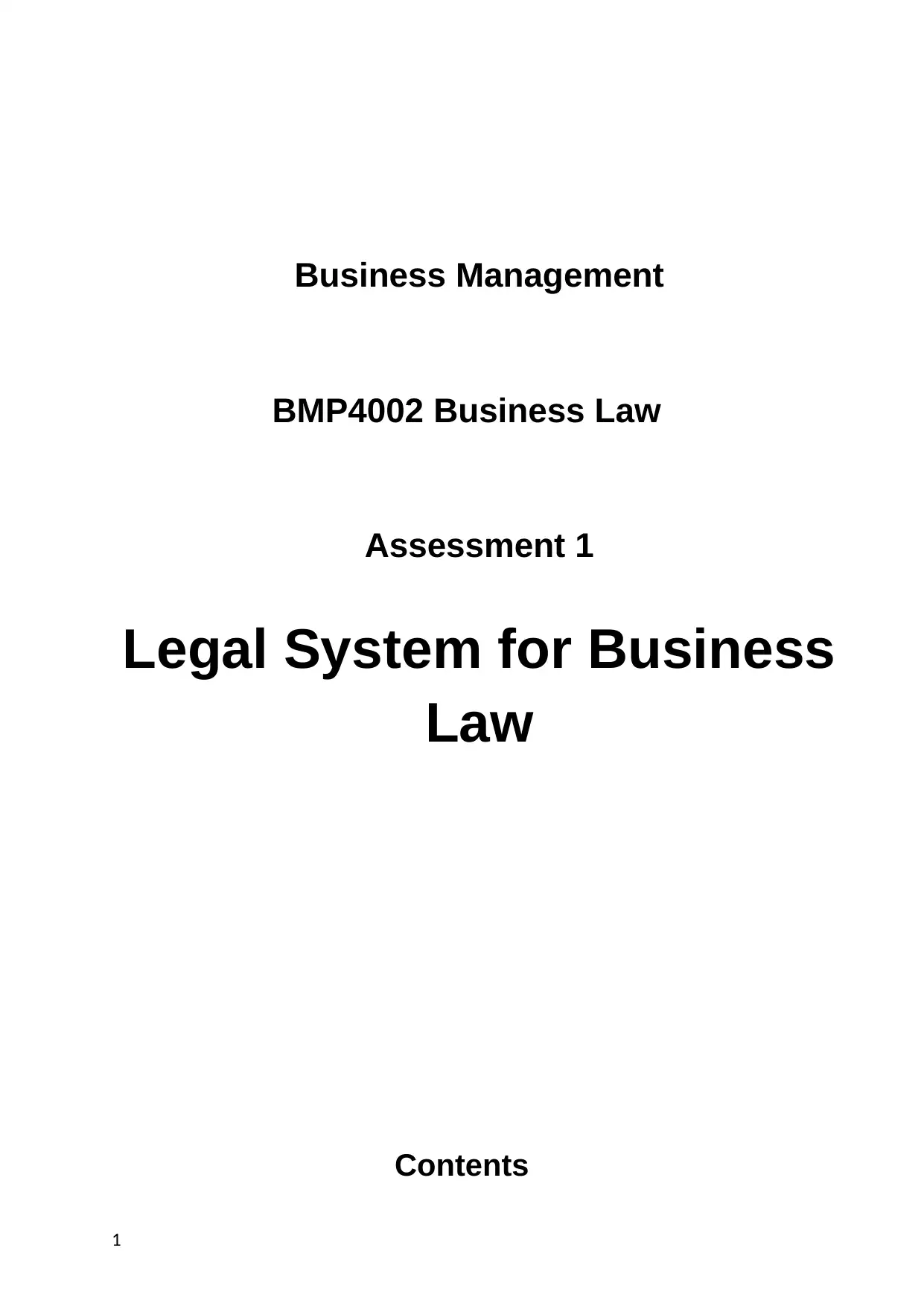
Business Management
BMP4002 Business Law
Assessment 1
Legal System for Business
Law
Contents
1
BMP4002 Business Law
Assessment 1
Legal System for Business
Law
Contents
1
Paraphrase This Document
Need a fresh take? Get an instant paraphrase of this document with our AI Paraphraser
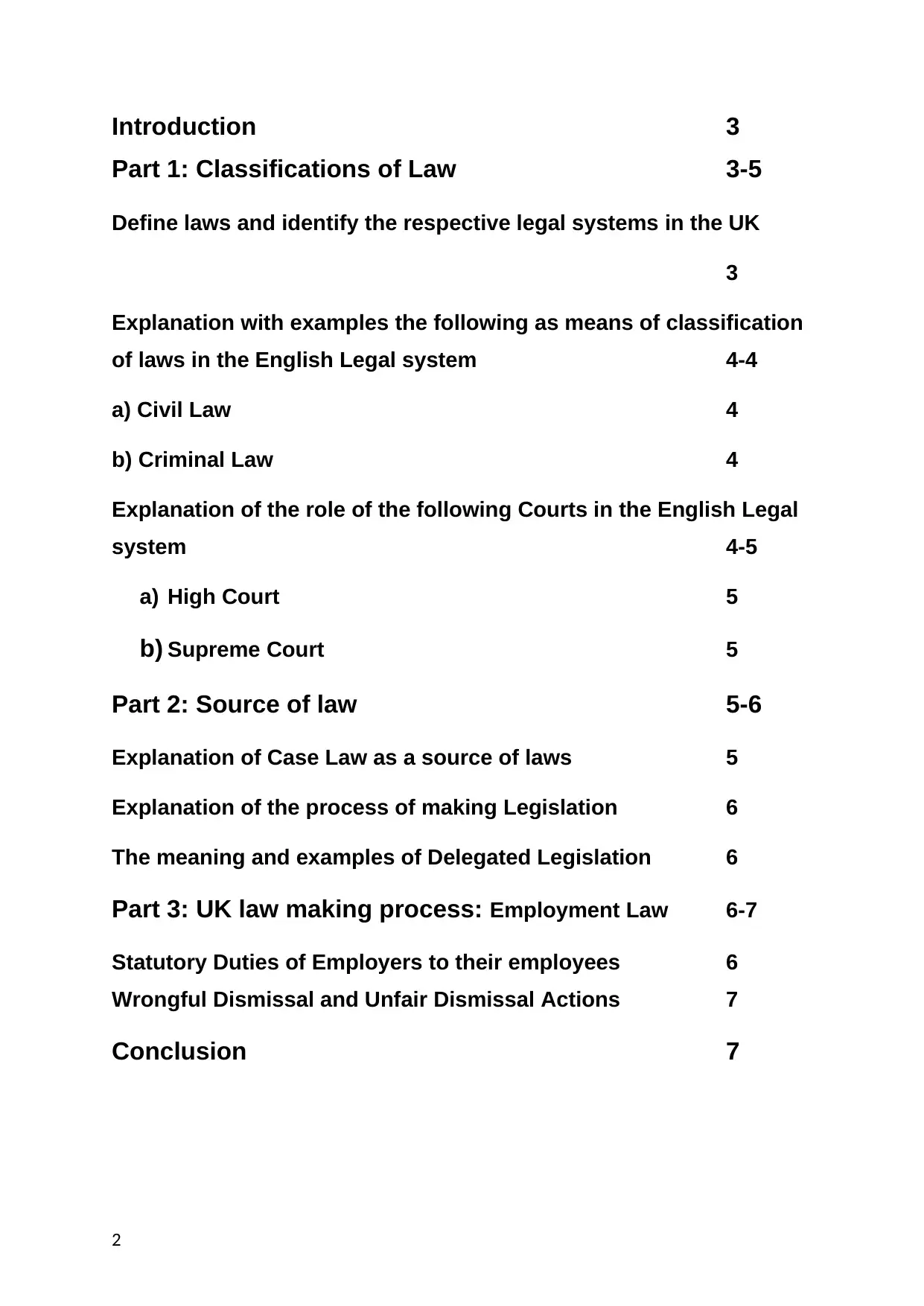
Introduction 3
Part 1: Classifications of Law 3-5
Define laws and identify the respective legal systems in the UK
3
Explanation with examples the following as means of classification
of laws in the English Legal system 4-4
a) Civil Law 4
b) Criminal Law 4
Explanation of the role of the following Courts in the English Legal
system 4-5
a) High Court 5
b) Supreme Court 5
Part 2: Source of law 5-6
Explanation of Case Law as a source of laws 5
Explanation of the process of making Legislation 6
The meaning and examples of Delegated Legislation 6
Part 3: UK law making process: Employment Law 6-7
Statutory Duties of Employers to their employees 6
Wrongful Dismissal and Unfair Dismissal Actions 7
Conclusion 7
2
Part 1: Classifications of Law 3-5
Define laws and identify the respective legal systems in the UK
3
Explanation with examples the following as means of classification
of laws in the English Legal system 4-4
a) Civil Law 4
b) Criminal Law 4
Explanation of the role of the following Courts in the English Legal
system 4-5
a) High Court 5
b) Supreme Court 5
Part 2: Source of law 5-6
Explanation of Case Law as a source of laws 5
Explanation of the process of making Legislation 6
The meaning and examples of Delegated Legislation 6
Part 3: UK law making process: Employment Law 6-7
Statutory Duties of Employers to their employees 6
Wrongful Dismissal and Unfair Dismissal Actions 7
Conclusion 7
2
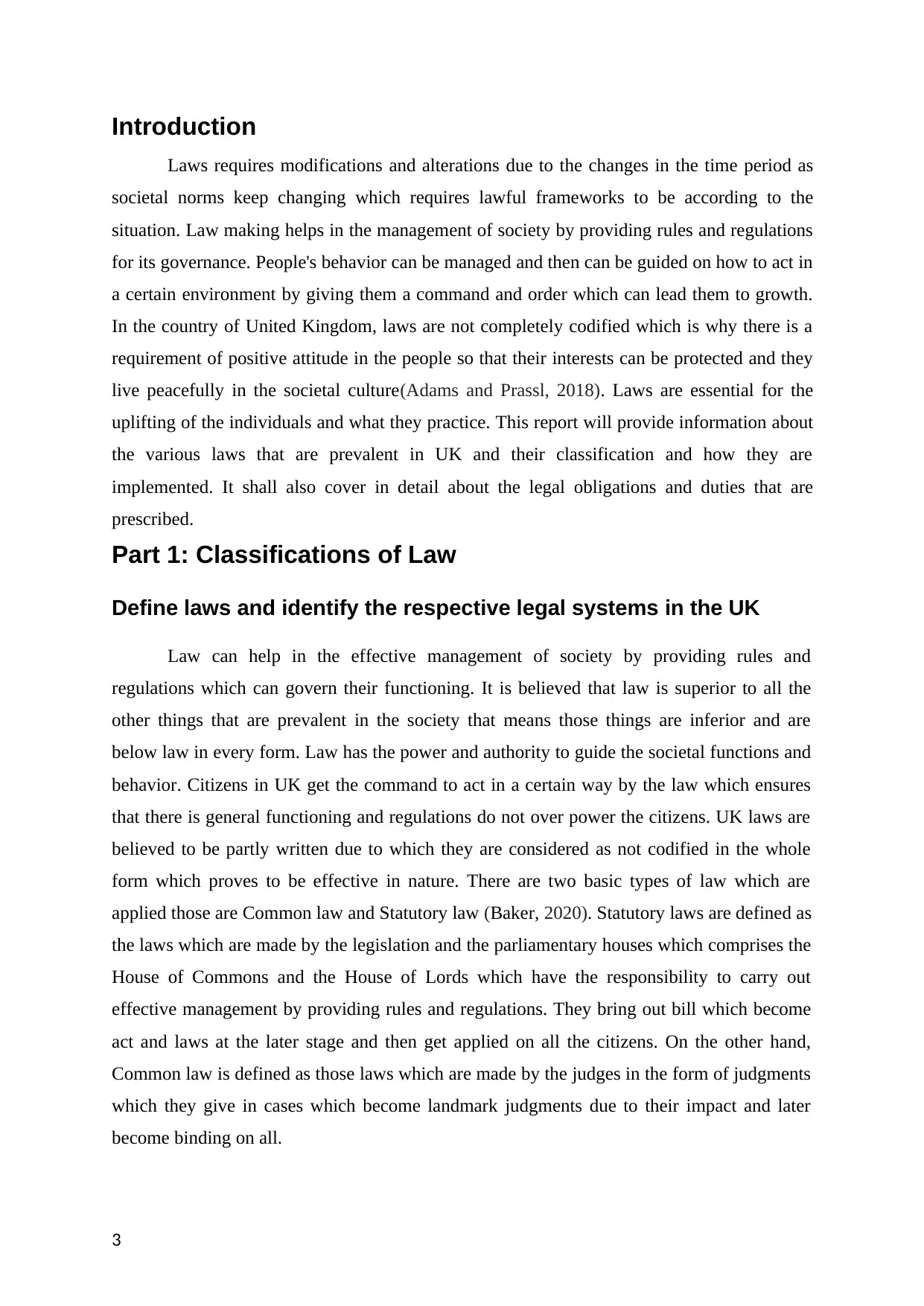
Introduction
Laws requires modifications and alterations due to the changes in the time period as
societal norms keep changing which requires lawful frameworks to be according to the
situation. Law making helps in the management of society by providing rules and regulations
for its governance. People's behavior can be managed and then can be guided on how to act in
a certain environment by giving them a command and order which can lead them to growth.
In the country of United Kingdom, laws are not completely codified which is why there is a
requirement of positive attitude in the people so that their interests can be protected and they
live peacefully in the societal culture(Adams and Prassl, 2018). Laws are essential for the
uplifting of the individuals and what they practice. This report will provide information about
the various laws that are prevalent in UK and their classification and how they are
implemented. It shall also cover in detail about the legal obligations and duties that are
prescribed.
Part 1: Classifications of Law
Define laws and identify the respective legal systems in the UK
Law can help in the effective management of society by providing rules and
regulations which can govern their functioning. It is believed that law is superior to all the
other things that are prevalent in the society that means those things are inferior and are
below law in every form. Law has the power and authority to guide the societal functions and
behavior. Citizens in UK get the command to act in a certain way by the law which ensures
that there is general functioning and regulations do not over power the citizens. UK laws are
believed to be partly written due to which they are considered as not codified in the whole
form which proves to be effective in nature. There are two basic types of law which are
applied those are Common law and Statutory law (Baker, 2020). Statutory laws are defined as
the laws which are made by the legislation and the parliamentary houses which comprises the
House of Commons and the House of Lords which have the responsibility to carry out
effective management by providing rules and regulations. They bring out bill which become
act and laws at the later stage and then get applied on all the citizens. On the other hand,
Common law is defined as those laws which are made by the judges in the form of judgments
which they give in cases which become landmark judgments due to their impact and later
become binding on all.
3
Laws requires modifications and alterations due to the changes in the time period as
societal norms keep changing which requires lawful frameworks to be according to the
situation. Law making helps in the management of society by providing rules and regulations
for its governance. People's behavior can be managed and then can be guided on how to act in
a certain environment by giving them a command and order which can lead them to growth.
In the country of United Kingdom, laws are not completely codified which is why there is a
requirement of positive attitude in the people so that their interests can be protected and they
live peacefully in the societal culture(Adams and Prassl, 2018). Laws are essential for the
uplifting of the individuals and what they practice. This report will provide information about
the various laws that are prevalent in UK and their classification and how they are
implemented. It shall also cover in detail about the legal obligations and duties that are
prescribed.
Part 1: Classifications of Law
Define laws and identify the respective legal systems in the UK
Law can help in the effective management of society by providing rules and
regulations which can govern their functioning. It is believed that law is superior to all the
other things that are prevalent in the society that means those things are inferior and are
below law in every form. Law has the power and authority to guide the societal functions and
behavior. Citizens in UK get the command to act in a certain way by the law which ensures
that there is general functioning and regulations do not over power the citizens. UK laws are
believed to be partly written due to which they are considered as not codified in the whole
form which proves to be effective in nature. There are two basic types of law which are
applied those are Common law and Statutory law (Baker, 2020). Statutory laws are defined as
the laws which are made by the legislation and the parliamentary houses which comprises the
House of Commons and the House of Lords which have the responsibility to carry out
effective management by providing rules and regulations. They bring out bill which become
act and laws at the later stage and then get applied on all the citizens. On the other hand,
Common law is defined as those laws which are made by the judges in the form of judgments
which they give in cases which become landmark judgments due to their impact and later
become binding on all.
3
⊘ This is a preview!⊘
Do you want full access?
Subscribe today to unlock all pages.

Trusted by 1+ million students worldwide
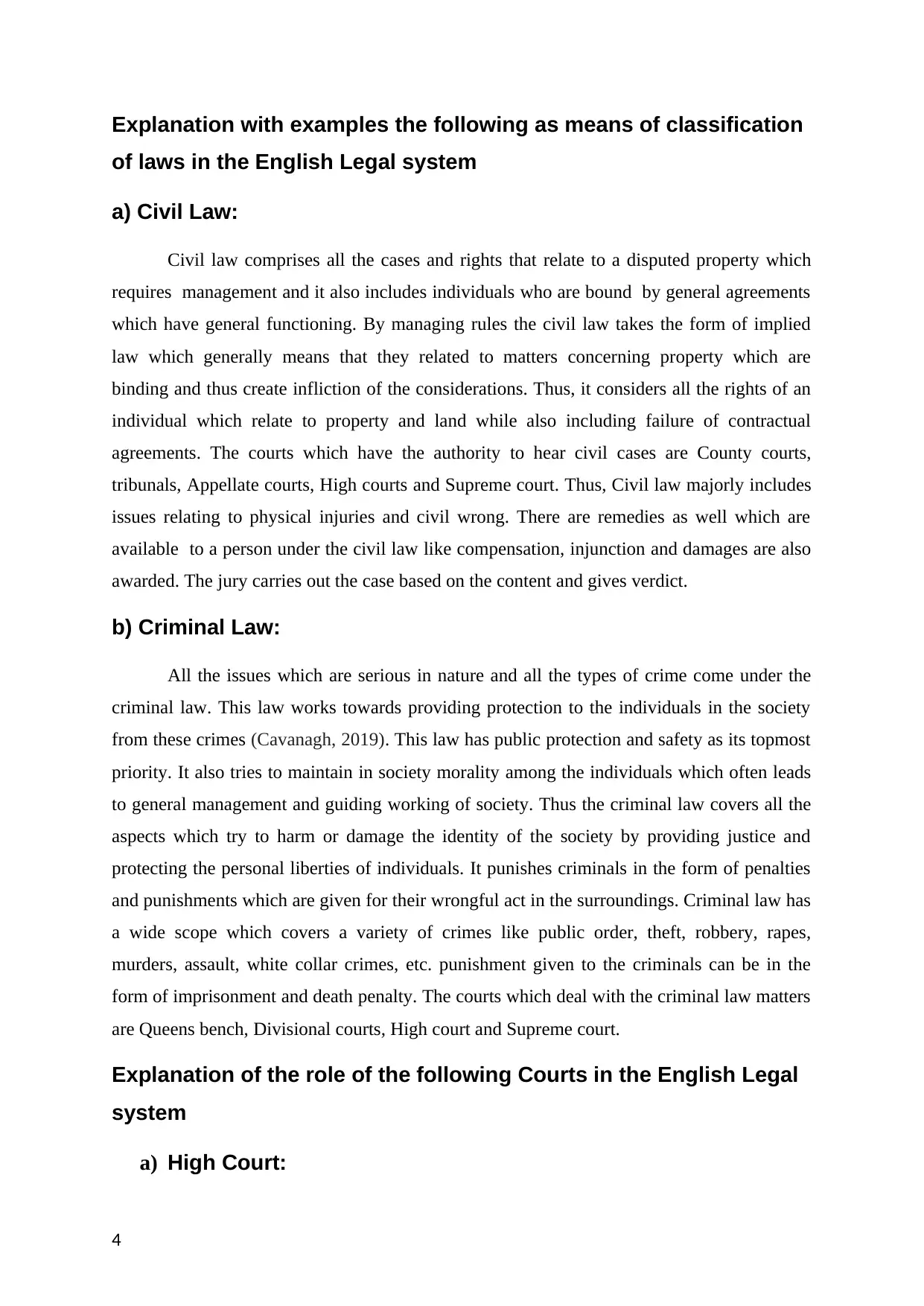
Explanation with examples the following as means of classification
of laws in the English Legal system
a) Civil Law:
Civil law comprises all the cases and rights that relate to a disputed property which
requires management and it also includes individuals who are bound by general agreements
which have general functioning. By managing rules the civil law takes the form of implied
law which generally means that they related to matters concerning property which are
binding and thus create infliction of the considerations. Thus, it considers all the rights of an
individual which relate to property and land while also including failure of contractual
agreements. The courts which have the authority to hear civil cases are County courts,
tribunals, Appellate courts, High courts and Supreme court. Thus, Civil law majorly includes
issues relating to physical injuries and civil wrong. There are remedies as well which are
available to a person under the civil law like compensation, injunction and damages are also
awarded. The jury carries out the case based on the content and gives verdict.
b) Criminal Law:
All the issues which are serious in nature and all the types of crime come under the
criminal law. This law works towards providing protection to the individuals in the society
from these crimes (Cavanagh, 2019). This law has public protection and safety as its topmost
priority. It also tries to maintain in society morality among the individuals which often leads
to general management and guiding working of society. Thus the criminal law covers all the
aspects which try to harm or damage the identity of the society by providing justice and
protecting the personal liberties of individuals. It punishes criminals in the form of penalties
and punishments which are given for their wrongful act in the surroundings. Criminal law has
a wide scope which covers a variety of crimes like public order, theft, robbery, rapes,
murders, assault, white collar crimes, etc. punishment given to the criminals can be in the
form of imprisonment and death penalty. The courts which deal with the criminal law matters
are Queens bench, Divisional courts, High court and Supreme court.
Explanation of the role of the following Courts in the English Legal
system
a) High Court:
4
of laws in the English Legal system
a) Civil Law:
Civil law comprises all the cases and rights that relate to a disputed property which
requires management and it also includes individuals who are bound by general agreements
which have general functioning. By managing rules the civil law takes the form of implied
law which generally means that they related to matters concerning property which are
binding and thus create infliction of the considerations. Thus, it considers all the rights of an
individual which relate to property and land while also including failure of contractual
agreements. The courts which have the authority to hear civil cases are County courts,
tribunals, Appellate courts, High courts and Supreme court. Thus, Civil law majorly includes
issues relating to physical injuries and civil wrong. There are remedies as well which are
available to a person under the civil law like compensation, injunction and damages are also
awarded. The jury carries out the case based on the content and gives verdict.
b) Criminal Law:
All the issues which are serious in nature and all the types of crime come under the
criminal law. This law works towards providing protection to the individuals in the society
from these crimes (Cavanagh, 2019). This law has public protection and safety as its topmost
priority. It also tries to maintain in society morality among the individuals which often leads
to general management and guiding working of society. Thus the criminal law covers all the
aspects which try to harm or damage the identity of the society by providing justice and
protecting the personal liberties of individuals. It punishes criminals in the form of penalties
and punishments which are given for their wrongful act in the surroundings. Criminal law has
a wide scope which covers a variety of crimes like public order, theft, robbery, rapes,
murders, assault, white collar crimes, etc. punishment given to the criminals can be in the
form of imprisonment and death penalty. The courts which deal with the criminal law matters
are Queens bench, Divisional courts, High court and Supreme court.
Explanation of the role of the following Courts in the English Legal
system
a) High Court:
4
Paraphrase This Document
Need a fresh take? Get an instant paraphrase of this document with our AI Paraphraser
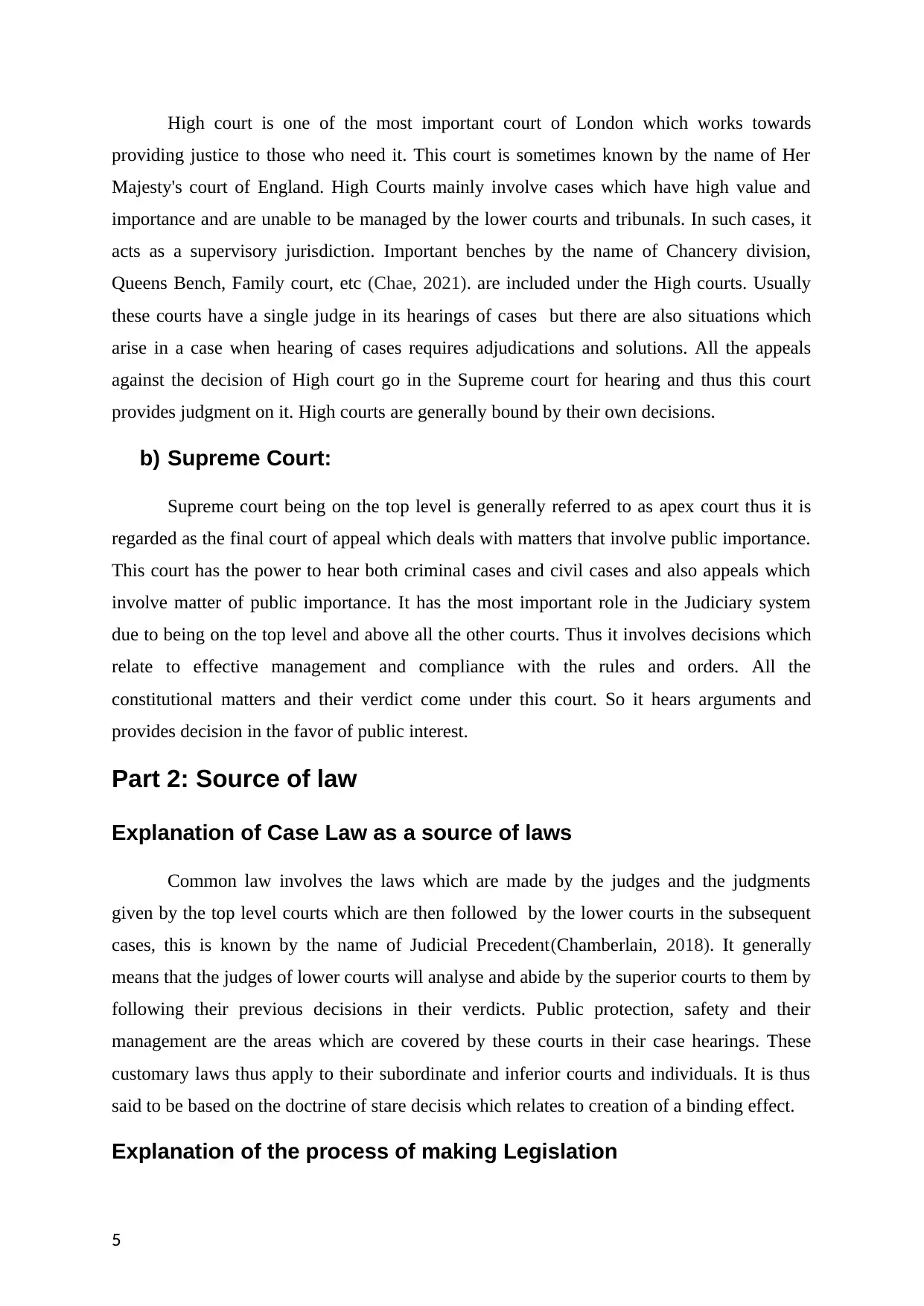
High court is one of the most important court of London which works towards
providing justice to those who need it. This court is sometimes known by the name of Her
Majesty's court of England. High Courts mainly involve cases which have high value and
importance and are unable to be managed by the lower courts and tribunals. In such cases, it
acts as a supervisory jurisdiction. Important benches by the name of Chancery division,
Queens Bench, Family court, etc (Chae, 2021). are included under the High courts. Usually
these courts have a single judge in its hearings of cases but there are also situations which
arise in a case when hearing of cases requires adjudications and solutions. All the appeals
against the decision of High court go in the Supreme court for hearing and thus this court
provides judgment on it. High courts are generally bound by their own decisions.
b) Supreme Court:
Supreme court being on the top level is generally referred to as apex court thus it is
regarded as the final court of appeal which deals with matters that involve public importance.
This court has the power to hear both criminal cases and civil cases and also appeals which
involve matter of public importance. It has the most important role in the Judiciary system
due to being on the top level and above all the other courts. Thus it involves decisions which
relate to effective management and compliance with the rules and orders. All the
constitutional matters and their verdict come under this court. So it hears arguments and
provides decision in the favor of public interest.
Part 2: Source of law
Explanation of Case Law as a source of laws
Common law involves the laws which are made by the judges and the judgments
given by the top level courts which are then followed by the lower courts in the subsequent
cases, this is known by the name of Judicial Precedent(Chamberlain, 2018). It generally
means that the judges of lower courts will analyse and abide by the superior courts to them by
following their previous decisions in their verdicts. Public protection, safety and their
management are the areas which are covered by these courts in their case hearings. These
customary laws thus apply to their subordinate and inferior courts and individuals. It is thus
said to be based on the doctrine of stare decisis which relates to creation of a binding effect.
Explanation of the process of making Legislation
5
providing justice to those who need it. This court is sometimes known by the name of Her
Majesty's court of England. High Courts mainly involve cases which have high value and
importance and are unable to be managed by the lower courts and tribunals. In such cases, it
acts as a supervisory jurisdiction. Important benches by the name of Chancery division,
Queens Bench, Family court, etc (Chae, 2021). are included under the High courts. Usually
these courts have a single judge in its hearings of cases but there are also situations which
arise in a case when hearing of cases requires adjudications and solutions. All the appeals
against the decision of High court go in the Supreme court for hearing and thus this court
provides judgment on it. High courts are generally bound by their own decisions.
b) Supreme Court:
Supreme court being on the top level is generally referred to as apex court thus it is
regarded as the final court of appeal which deals with matters that involve public importance.
This court has the power to hear both criminal cases and civil cases and also appeals which
involve matter of public importance. It has the most important role in the Judiciary system
due to being on the top level and above all the other courts. Thus it involves decisions which
relate to effective management and compliance with the rules and orders. All the
constitutional matters and their verdict come under this court. So it hears arguments and
provides decision in the favor of public interest.
Part 2: Source of law
Explanation of Case Law as a source of laws
Common law involves the laws which are made by the judges and the judgments
given by the top level courts which are then followed by the lower courts in the subsequent
cases, this is known by the name of Judicial Precedent(Chamberlain, 2018). It generally
means that the judges of lower courts will analyse and abide by the superior courts to them by
following their previous decisions in their verdicts. Public protection, safety and their
management are the areas which are covered by these courts in their case hearings. These
customary laws thus apply to their subordinate and inferior courts and individuals. It is thus
said to be based on the doctrine of stare decisis which relates to creation of a binding effect.
Explanation of the process of making Legislation
5
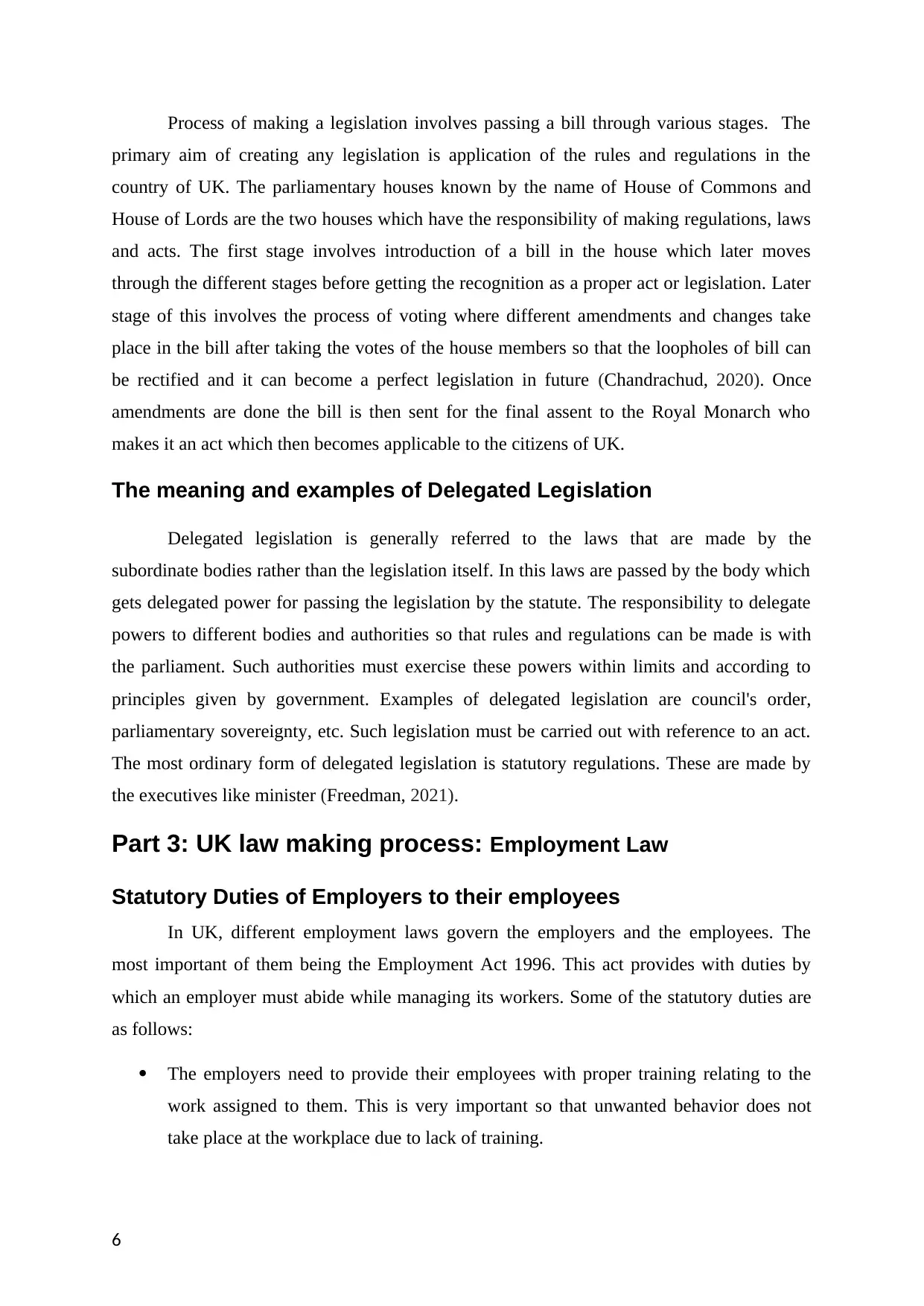
Process of making a legislation involves passing a bill through various stages. The
primary aim of creating any legislation is application of the rules and regulations in the
country of UK. The parliamentary houses known by the name of House of Commons and
House of Lords are the two houses which have the responsibility of making regulations, laws
and acts. The first stage involves introduction of a bill in the house which later moves
through the different stages before getting the recognition as a proper act or legislation. Later
stage of this involves the process of voting where different amendments and changes take
place in the bill after taking the votes of the house members so that the loopholes of bill can
be rectified and it can become a perfect legislation in future (Chandrachud, 2020). Once
amendments are done the bill is then sent for the final assent to the Royal Monarch who
makes it an act which then becomes applicable to the citizens of UK.
The meaning and examples of Delegated Legislation
Delegated legislation is generally referred to the laws that are made by the
subordinate bodies rather than the legislation itself. In this laws are passed by the body which
gets delegated power for passing the legislation by the statute. The responsibility to delegate
powers to different bodies and authorities so that rules and regulations can be made is with
the parliament. Such authorities must exercise these powers within limits and according to
principles given by government. Examples of delegated legislation are council's order,
parliamentary sovereignty, etc. Such legislation must be carried out with reference to an act.
The most ordinary form of delegated legislation is statutory regulations. These are made by
the executives like minister (Freedman, 2021).
Part 3: UK law making process: Employment Law
Statutory Duties of Employers to their employees
In UK, different employment laws govern the employers and the employees. The
most important of them being the Employment Act 1996. This act provides with duties by
which an employer must abide while managing its workers. Some of the statutory duties are
as follows:
The employers need to provide their employees with proper training relating to the
work assigned to them. This is very important so that unwanted behavior does not
take place at the workplace due to lack of training.
6
primary aim of creating any legislation is application of the rules and regulations in the
country of UK. The parliamentary houses known by the name of House of Commons and
House of Lords are the two houses which have the responsibility of making regulations, laws
and acts. The first stage involves introduction of a bill in the house which later moves
through the different stages before getting the recognition as a proper act or legislation. Later
stage of this involves the process of voting where different amendments and changes take
place in the bill after taking the votes of the house members so that the loopholes of bill can
be rectified and it can become a perfect legislation in future (Chandrachud, 2020). Once
amendments are done the bill is then sent for the final assent to the Royal Monarch who
makes it an act which then becomes applicable to the citizens of UK.
The meaning and examples of Delegated Legislation
Delegated legislation is generally referred to the laws that are made by the
subordinate bodies rather than the legislation itself. In this laws are passed by the body which
gets delegated power for passing the legislation by the statute. The responsibility to delegate
powers to different bodies and authorities so that rules and regulations can be made is with
the parliament. Such authorities must exercise these powers within limits and according to
principles given by government. Examples of delegated legislation are council's order,
parliamentary sovereignty, etc. Such legislation must be carried out with reference to an act.
The most ordinary form of delegated legislation is statutory regulations. These are made by
the executives like minister (Freedman, 2021).
Part 3: UK law making process: Employment Law
Statutory Duties of Employers to their employees
In UK, different employment laws govern the employers and the employees. The
most important of them being the Employment Act 1996. This act provides with duties by
which an employer must abide while managing its workers. Some of the statutory duties are
as follows:
The employers need to provide their employees with proper training relating to the
work assigned to them. This is very important so that unwanted behavior does not
take place at the workplace due to lack of training.
6
⊘ This is a preview!⊘
Do you want full access?
Subscribe today to unlock all pages.

Trusted by 1+ million students worldwide
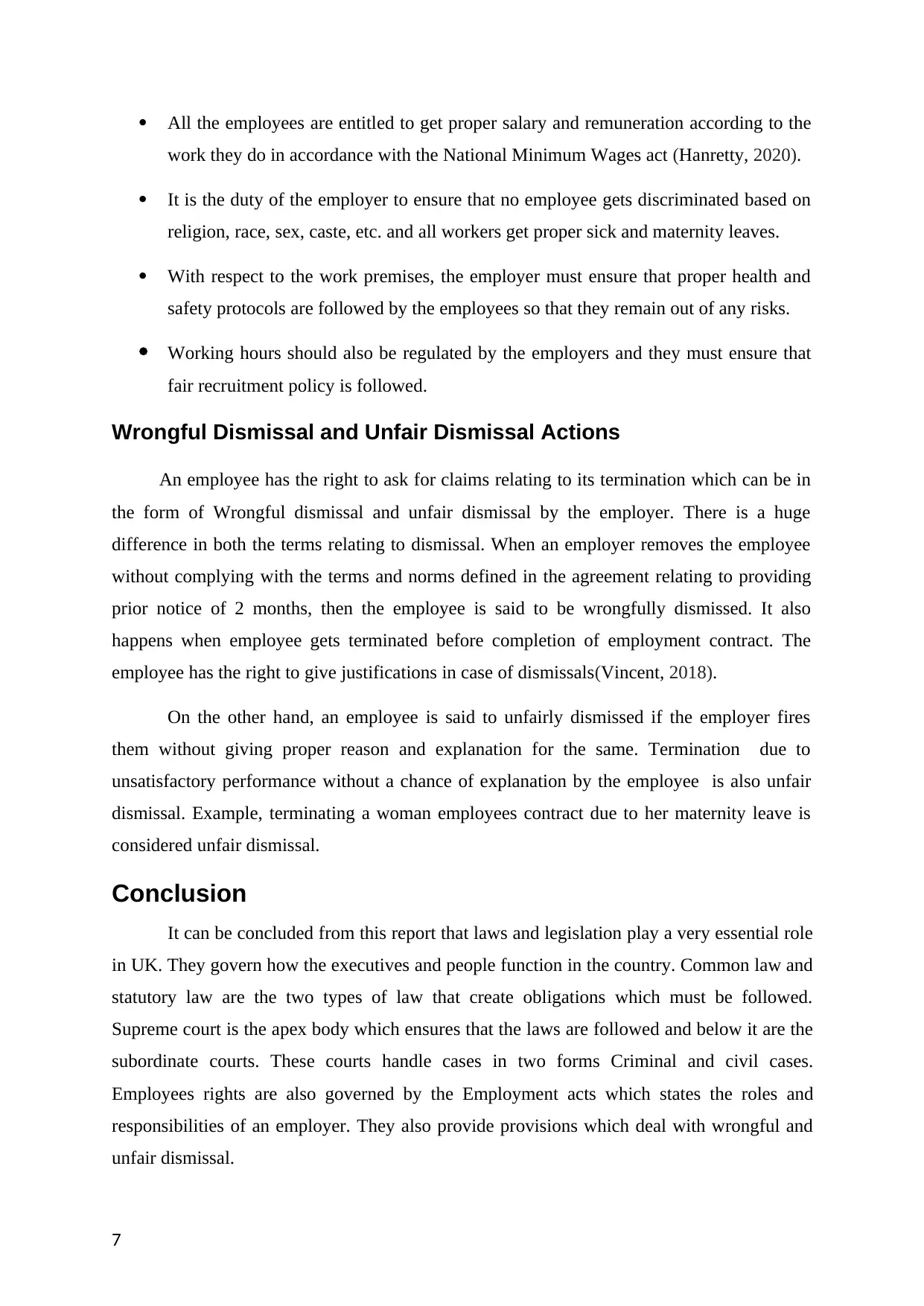
All the employees are entitled to get proper salary and remuneration according to the
work they do in accordance with the National Minimum Wages act (Hanretty, 2020).
It is the duty of the employer to ensure that no employee gets discriminated based on
religion, race, sex, caste, etc. and all workers get proper sick and maternity leaves.
With respect to the work premises, the employer must ensure that proper health and
safety protocols are followed by the employees so that they remain out of any risks.
Working hours should also be regulated by the employers and they must ensure that
fair recruitment policy is followed.
Wrongful Dismissal and Unfair Dismissal Actions
An employee has the right to ask for claims relating to its termination which can be in
the form of Wrongful dismissal and unfair dismissal by the employer. There is a huge
difference in both the terms relating to dismissal. When an employer removes the employee
without complying with the terms and norms defined in the agreement relating to providing
prior notice of 2 months, then the employee is said to be wrongfully dismissed. It also
happens when employee gets terminated before completion of employment contract. The
employee has the right to give justifications in case of dismissals(Vincent, 2018).
On the other hand, an employee is said to unfairly dismissed if the employer fires
them without giving proper reason and explanation for the same. Termination due to
unsatisfactory performance without a chance of explanation by the employee is also unfair
dismissal. Example, terminating a woman employees contract due to her maternity leave is
considered unfair dismissal.
Conclusion
It can be concluded from this report that laws and legislation play a very essential role
in UK. They govern how the executives and people function in the country. Common law and
statutory law are the two types of law that create obligations which must be followed.
Supreme court is the apex body which ensures that the laws are followed and below it are the
subordinate courts. These courts handle cases in two forms Criminal and civil cases.
Employees rights are also governed by the Employment acts which states the roles and
responsibilities of an employer. They also provide provisions which deal with wrongful and
unfair dismissal.
7
work they do in accordance with the National Minimum Wages act (Hanretty, 2020).
It is the duty of the employer to ensure that no employee gets discriminated based on
religion, race, sex, caste, etc. and all workers get proper sick and maternity leaves.
With respect to the work premises, the employer must ensure that proper health and
safety protocols are followed by the employees so that they remain out of any risks.
Working hours should also be regulated by the employers and they must ensure that
fair recruitment policy is followed.
Wrongful Dismissal and Unfair Dismissal Actions
An employee has the right to ask for claims relating to its termination which can be in
the form of Wrongful dismissal and unfair dismissal by the employer. There is a huge
difference in both the terms relating to dismissal. When an employer removes the employee
without complying with the terms and norms defined in the agreement relating to providing
prior notice of 2 months, then the employee is said to be wrongfully dismissed. It also
happens when employee gets terminated before completion of employment contract. The
employee has the right to give justifications in case of dismissals(Vincent, 2018).
On the other hand, an employee is said to unfairly dismissed if the employer fires
them without giving proper reason and explanation for the same. Termination due to
unsatisfactory performance without a chance of explanation by the employee is also unfair
dismissal. Example, terminating a woman employees contract due to her maternity leave is
considered unfair dismissal.
Conclusion
It can be concluded from this report that laws and legislation play a very essential role
in UK. They govern how the executives and people function in the country. Common law and
statutory law are the two types of law that create obligations which must be followed.
Supreme court is the apex body which ensures that the laws are followed and below it are the
subordinate courts. These courts handle cases in two forms Criminal and civil cases.
Employees rights are also governed by the Employment acts which states the roles and
responsibilities of an employer. They also provide provisions which deal with wrongful and
unfair dismissal.
7
Paraphrase This Document
Need a fresh take? Get an instant paraphrase of this document with our AI Paraphraser
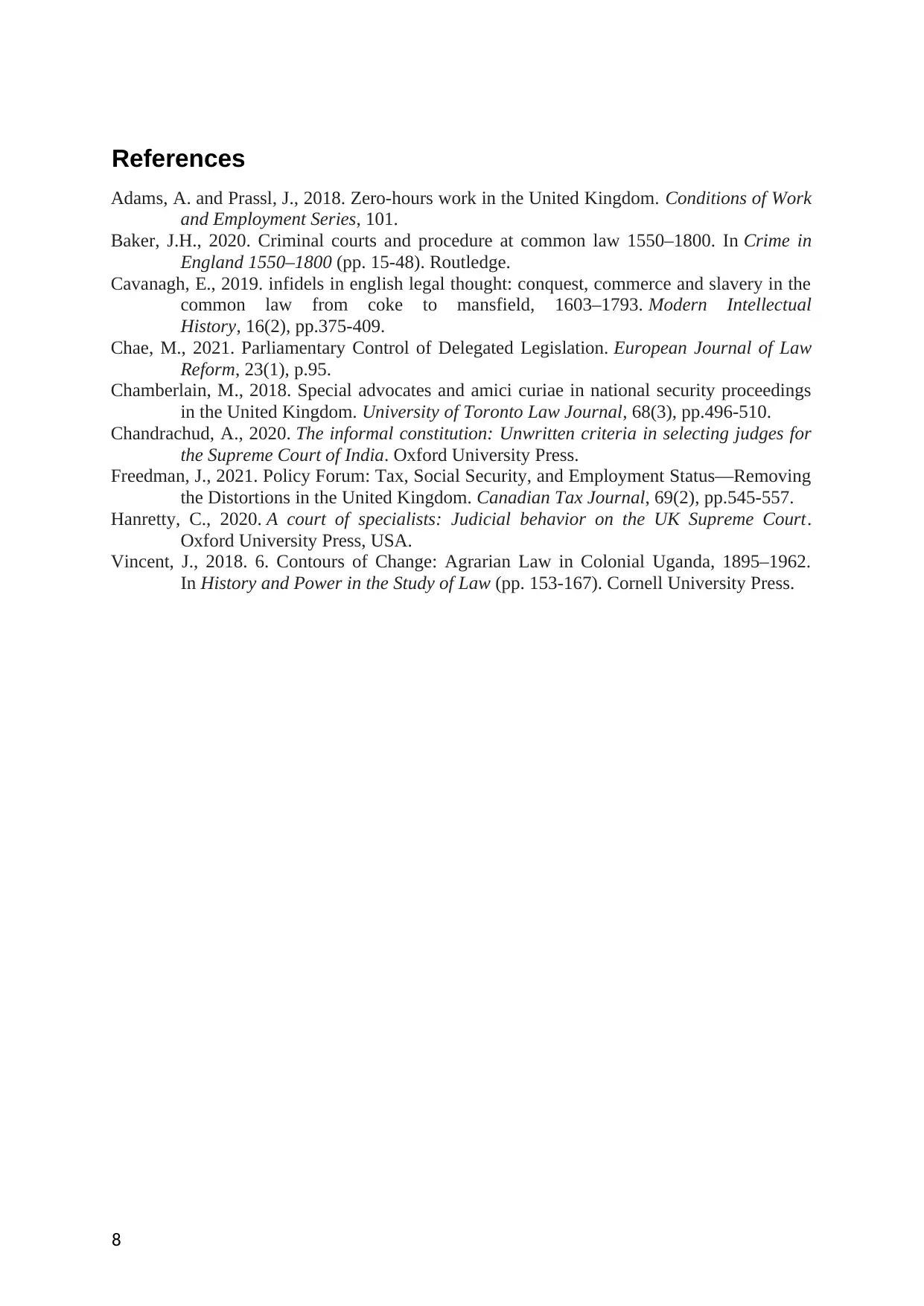
References
Adams, A. and Prassl, J., 2018. Zero-hours work in the United Kingdom. Conditions of Work
and Employment Series, 101.
Baker, J.H., 2020. Criminal courts and procedure at common law 1550–1800. In Crime in
England 1550–1800 (pp. 15-48). Routledge.
Cavanagh, E., 2019. infidels in english legal thought: conquest, commerce and slavery in the
common law from coke to mansfield, 1603–1793. Modern Intellectual
History, 16(2), pp.375-409.
Chae, M., 2021. Parliamentary Control of Delegated Legislation. European Journal of Law
Reform, 23(1), p.95.
Chamberlain, M., 2018. Special advocates and amici curiae in national security proceedings
in the United Kingdom. University of Toronto Law Journal, 68(3), pp.496-510.
Chandrachud, A., 2020. The informal constitution: Unwritten criteria in selecting judges for
the Supreme Court of India. Oxford University Press.
Freedman, J., 2021. Policy Forum: Tax, Social Security, and Employment Status—Removing
the Distortions in the United Kingdom. Canadian Tax Journal, 69(2), pp.545-557.
Hanretty, C., 2020. A court of specialists: Judicial behavior on the UK Supreme Court.
Oxford University Press, USA.
Vincent, J., 2018. 6. Contours of Change: Agrarian Law in Colonial Uganda, 1895–1962.
In History and Power in the Study of Law (pp. 153-167). Cornell University Press.
8
Adams, A. and Prassl, J., 2018. Zero-hours work in the United Kingdom. Conditions of Work
and Employment Series, 101.
Baker, J.H., 2020. Criminal courts and procedure at common law 1550–1800. In Crime in
England 1550–1800 (pp. 15-48). Routledge.
Cavanagh, E., 2019. infidels in english legal thought: conquest, commerce and slavery in the
common law from coke to mansfield, 1603–1793. Modern Intellectual
History, 16(2), pp.375-409.
Chae, M., 2021. Parliamentary Control of Delegated Legislation. European Journal of Law
Reform, 23(1), p.95.
Chamberlain, M., 2018. Special advocates and amici curiae in national security proceedings
in the United Kingdom. University of Toronto Law Journal, 68(3), pp.496-510.
Chandrachud, A., 2020. The informal constitution: Unwritten criteria in selecting judges for
the Supreme Court of India. Oxford University Press.
Freedman, J., 2021. Policy Forum: Tax, Social Security, and Employment Status—Removing
the Distortions in the United Kingdom. Canadian Tax Journal, 69(2), pp.545-557.
Hanretty, C., 2020. A court of specialists: Judicial behavior on the UK Supreme Court.
Oxford University Press, USA.
Vincent, J., 2018. 6. Contours of Change: Agrarian Law in Colonial Uganda, 1895–1962.
In History and Power in the Study of Law (pp. 153-167). Cornell University Press.
8
1 out of 8
Related Documents
Your All-in-One AI-Powered Toolkit for Academic Success.
+13062052269
info@desklib.com
Available 24*7 on WhatsApp / Email
![[object Object]](/_next/static/media/star-bottom.7253800d.svg)
Unlock your academic potential
Copyright © 2020–2026 A2Z Services. All Rights Reserved. Developed and managed by ZUCOL.
